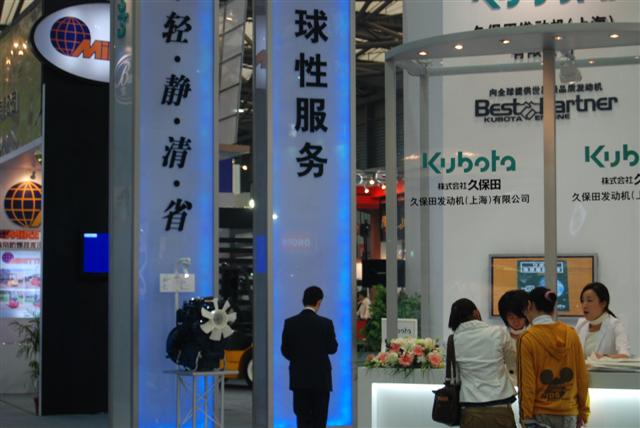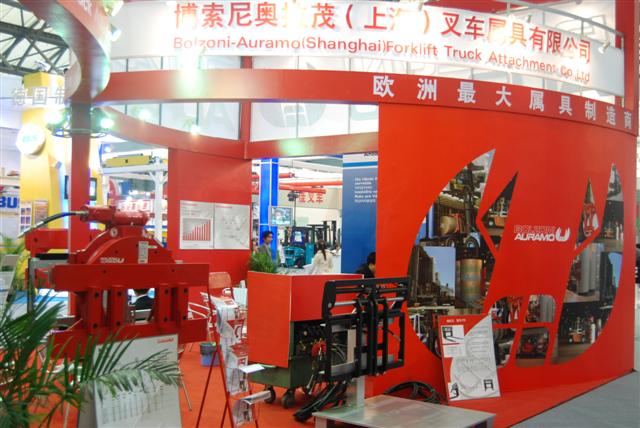Concerns about the global economic downturn cast a shadow over CeMAT Asia, held in Shanghai last week, but the fears didn't prevent a record number of exhibitors from participating.
Final visitor numbers were not available as this newsletter was finalised, but exhibitors were upbeat about both the quantity and the quality of delegates. There was, however, a feeling that an annual trade show was not necessary, and suppliers would be better served by less frequent events like the CeMAT Europe schedule.
For the scores of Chinese manufacturers, CeMAT Asia was as much about finding new export distribution partners as about showing off new product.
Forklift maker Thankyou was back at CeMAT and president Han Jun noted strong interest in his company's new AC-powered reach-stacker. Han was among many exhibitors keen to link up with overseas partners, having already grown exports to 20% of sales.
Concerned about the slowdown, Thankyou is hoping to hold revenue levels next year with some larger orders from bigger customers.
Another second-time visitor, UN, is following the lead of companies like Jungheinrich and focusing on quality. Import and export manager Linpoll Zou said the company's three-directional narrow-aisle vehicle, on show for the first time in China, was a good example of the company's new direction. UN is taking advantage of the slowdown to halt production of old products and focus on new, quality offerings. The slowdown represents a good chance to make the change, he said.
 |
CeMAT veteran Ningbo Ruyi was the first Chinese exhibitor at CeMAT in Germany and has participated in the Chinese show since its launch. Ningbo Ruyi showed off a new explosion-proof Xilin model, approved by the Chinese government. Despite the new model, Chu Jiang, vice president, said he is expecting a fall in orders, especially domestic Chinese orders. He cites local supermarket chains which added 50 stores this year, but next year will open far fewer, requiring less equipment. However, the crisis may have a silver lining for the export market. He said when things are going well, international companies are not too concerned about price. But when things get tough, cost becomes an issue, and this presents an opportunity for Chinese manufacturers. Chu is confident Ningbo Ruyi will maintain its 2008 revenue levels in 2009, and will be growing again by 2010.
German giant Jungheinrich got lots of interest in its prototype lithium-ion smart battery installed in working forklift. Sales and marketing director of Jungheinrich China, Alexander Oezbahadir, said the Chinese-developed battery had never been seen before and is being produced for use in high-end automotive products for the likes of BMW and Volkswagen.
Oezbahadir said his company is focusing on solutions rather than products, and he expects continued growth - albeit a bit slower than the 16-17% annual growth enjoyed to date. "Customers in China are getting more and more sophisticated," he said, and demanding quality products and quality service.
China's Sunward brand, with a long pedigree in the industrial, construction and excavator market, was a first-time exhibitor at CeMAT with its all-new forklift range. Like UN, Sunward will use the anticipated market lull to focus on its internal systems and to find partners so that it can build exports to 50% of its sales, according to export manager Li Jun.
Another relative newcomer was Goodsense, which entered the forklift market two years ago. Sales manager Jerry Huang had seven vehicles on display, including a new three-wheel AC electric PSD axle forklift featuring imported Korean transmissions. Braced for a slowdown both locally and in the export market, Huang used the show to scout out dealers to build a global network, and said he had several firm prospects by show's end.
 |
Battery maker FAAM was back in Shanghai for the fourth time, according to senior executive Ermanno Vitali. He was impressed with both the quality and quantity of contacts at the three-day event, and found it useful for catching up with all the company's big-name partners. They, in turn, showed strong interest in FAAM's new Envirotech battery and charger system which promises to save the cost of one new battery during a five-year operation of the new system. Vitali believes companies like his have an advantage over the less-specialised Chinese competitors because of the expertise they have developed by focusing on a single product.
Terry Huang, export executive of Noblift Equipment, thought there were fewer visitors this year due to the slow economy. Like some of his rivals, the walkie and stacker specialist expects to use the market cooling to concentrate on new designs. He noted that some rivals have moved from one- to two-day weekends because of slowing orders, but said Noblift had not felt the need to reduce its employment levels.
Stephen Ling from Hytsu was among the exhibitors who would prefer CeMAT to be held every three years. He believes visitor numbers would be increased if it weren't an annual event. Nonetheless, his company used the show to debut some new heavy-duty AC electric forklift models which attracted positive feedback. While somewhat concerned about the slowdown, Hytsu is in a good position with many "stable customers", especially export customers, he said.
Jiangsu Baoli Group president Gao Zhou Fei said the impact of the economic dip was evident at this year's CeMAT. However, Baoli isn't yet feeling any direct effects itself, and the 31st-largest player in the market is already planning to diversify and "take other steps" to cope with the changes. One strategy is to focus on quality, and Baoli is determined to "produce the best Chinese forklifts in the world".
For Wang Guisheng, vice general manager at Hangzhou Global Friend Precision Machinery Co, this year's show seemed to attract more international visitors, many interested in his company's new 10-tonne forklift. Wang sees all industries being affected by the global downturn and forklifts won't escape the impact, he said. Even discounting won't stimulate demand in a slowing market, he said, so it makes sense to limit production. He also predicts a shake-out, with only the strongest players surviving.
Attachment maker Kaup is noting a "cooling down" in the market, according to engineer Thorsten Martin, who has heard of slowing orders from all of its manufacturing partners. Generally, attachment makers feel the impact a little later in the cycle, so Martin is expecting any effects "in a couple of months".
CeMAT Asia 2008 featured 380 exhibitors and prior to the event, organisers predicted that the expo would attract 60,000 visitors over its three days.
For more CeMAT faces and places, visit our gallery.